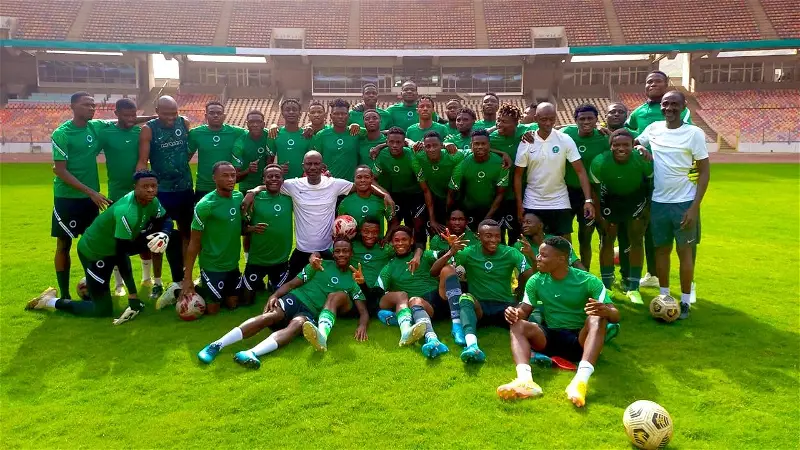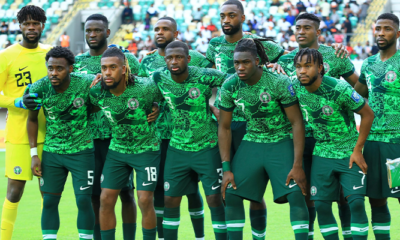Latest News
U20 AFCON: How Nigeria’s Flying Eagles became the most successful U20 national team on the continent

The Nigerian U-20 nationwide group is essentially the most profitable U-20 nationwide group in African historical past.
Popularly nicknamed the Flying Eagles, the group boasts an unmatched trophy cupboard that homes seven continental titles, two silver, and three bronze Afcon medals.
There are additionally two silver medals and one bronze medal from the U-20 FIFA World Cup – a haul bettered by none on the black continent moreover Ghana.
So, how did Nigeria outperform all others on the U-20 Africa Cup of Nations?
The U-20 Africa Cup of Nations was the hardest to win within the early days after its inaugural version.
The competitors format was set for groups to play one another at residence and away, with the winner on mixture transferring to the following spherical.
Residence groups deployed a number of darkish, underhand ways to achieve an undue benefit over unsuspecting opponents, making it troublesome for any nation to dominate the Afcon. No nationwide u-20 group discovered it simple to carry out constantly on the continent’s highest stage in these days. None however the Flying Eagles.
Algeria received the maiden version of the u-20 Afcon in 1979, beating Guinea within the closing, with Nigeria ending third.
The Flying Eagles returned to choose a second bronze medal in 1981 as Egypt and Cameroon completed within the first two positions.
The dominant years
Nigeria lastly lifted her first u-20 Afcon title in 1983 after defeating Ivory Coast 4-3 on mixture within the closing. The group picked up a 2-2 away draw earlier than edging the return leg 2-1 to qualify for the 1983 FIFA World Youth Championship.
The Flying Eagles turned the primary to retain the Afcon title after reaching the ultimate once more in 1985, the place Tunisia waited.
And that group, brewing with the skills of Monday Odiaka, Niyi Adeleye, and Samson Siasia, overpowered the Tunisians and went all the way in which to complete third at that yr’s World Youth Championship.
A 3rd consecutive title adopted for Nigeria in 1987 when the group thrashed Togo residence and away for a 5-1 mixture victory in one of the crucial one-sided closing matches ever.
A report fourth African title arrived on the 1989 version as a Mutiu Adepoju-inspired Flying Eagles romped previous Mali within the closing after a gruelling marketing campaign.
And with the likes of Christopher Ohenhen, Nduka Ugbade, and Christopher Nwosu in that group, Nigeria additionally made it to the ultimate of the FIFA U-20 World Cup, the place solely Portugal have been the stumbling block.
Nigeria’s unprecedented dominance lastly led to 1991 because the organisers modified the competitors’s format, with the final eight groups gathering in Egypt in a gaggle stage spherical for the primary time in historical past.

The tough occasions
Surprisingly, defending champions, Nigeria didn’t enter for that match and crashed out on the group stage of the following version.
Nigeria, nonetheless, opted to host the 1995 U-20 Afcon. Sadly, the Flying Eagles solely completed third after dropping to Cameroon within the semifinals in Kaduna and beating Mali in Ibadan within the third-place decider.
The nation did not qualify for the 1997 version solely to return in 1999 to complete second behind Ghana, due to the skills of Haruna Babangida, Joseph Yobo, Julius Aghahowa, and Pius Ikedia, amongst others.
The return of the King
Nigeria hosted the FIFA World Youth Championship that yr however crashed out within the quarterfinals after dropping 3-1 to Mali in Enugu.
After an embarrassing group stage exit in 2001 and failing to qualify for Burkina Faso 2003, the Flying Eagles returned in type to energy to the title in 2005.
Blessed with the likes of Isaac Promise, Victor Obinna Nsofor, and Taye Taiwo, the Eagles beat all-comers, together with Egypt, within the closing to say a fifth U20 Afcon title and a primary since 1989.
Joined by Mikel Obi afterwards, the Flying Eagles made it to the ultimate of the U-20 World Cup, the place they narrowly misplaced to a Lionel Messi-inspired Argentina.
Following a silver medal end in 2007 and a bronze medal end in 2009, Nigeria returned to the rostrum in 2011 in South Africa.
Thanks largely to Uche Nwofor’s tournament-high 4 objectives and respectable assist solid performances from Olarenwaju Kayode, Terry Envoh, and Stanley Okoro, the Flying Eagles claimed a sixth title after beating Cameroon 3-2 within the closing.
Nigeria’s dominance continued with a third-place putting in 2013 earlier than romping to a seventh continental crown in 2015.
Fired on by objectives from Musa Muhammed and Taiwo Awoniyi, the Flying Eagles defeated Congo, Ghana, and Senegal twice – within the group stage and within the closing – to emerge as Africa’s finest for a record-extending seventh time.

The calm earlier than the storm?
The Flying Eagles haven’t received the title since, ending fourth solely in 2019 whereas failing to qualify for the opposite two editions in-between.
The previous champions are again at Egypt 2023 beneath the tutelage of head coach Ladan Bosso with the group charged with choosing a World Cup ticket and an eighth Afcon trophy.
The Eagles’ first sport is towards Senegal on Sunday night earlier than dealing with hosts Egypt and Mozambique in different Group A fixtures.










